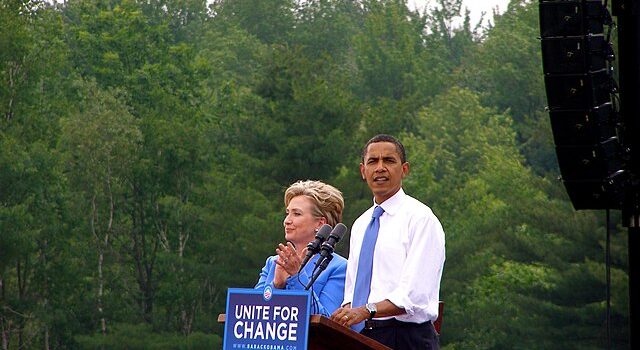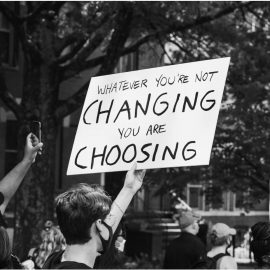

This article is an excerpt from the Shortform book guide to "A Promised Land" by Barack Obama. Shortform has the world's best summaries and analyses of books you should be reading.
Like this article? Sign up for a free trial here .
What was the relationship between Obama and Clinton like? How did the relationship change when he got the nomination?
Throughout the campaign, the Obama and Clinton battled for the Democratic nomination. After Obama won the nomination, Clinton helped support his campaign.
Read more about the campaign rivalry between Obama and Clinton and how it affected Obama’s campaign.
Obama and Clinton: The Reality of Racial Politics
These racial dimensions of the primary became even clearer when the campaign headed down to South Carolina for the primary on January 26. There, the Clinton campaign (and former president Bill Clinton in particular) began making barely coded racial appeals to white voters. Bill Clinton told white audiences that the Obama message and candidacy were a “fairy tale” and assured them that, unlike Barack, Hillary was the only one who truly “got them.”
The message was that Barack Obama was somehow a dangerous, unacceptable “other.” Media pundits amplified that message by casting shadows over Obama’s childhood years in Indonesia, his refusal to wear an American flag lapel (a concern that was never raised with white candidates who similarly made the choice not to wear one), and the characterization of Michelle as an “angry Black woman.”
Despite the mounting ugliness of the campaign, Barack’s team managed to appeal to Black South Carolinians as no other candidate ever had, uprooting them from a cynicism born of a legacy of disenfranchisement, poverty, and racial violence.
With his message of empowerment, the Black vote in South Carolina powered the Obama team to a smashing win in South Carolina. Still, as the ebullient crowd at Obama headquarters chanted “Race doesn’t matter,” Obama had his misgivings. Indeed, the campaign up to that point had taught him that race still did matter a great deal.
Clinching the Nomination
The Obama and Clinton rivalry continued. The Obama team continued to rack up wins in primaries and caucuses throughout the spring, adding to their delegate lead and making the path to the nomination more and more difficult for Hillary Clinton.
Clinton still refused to concede, however. This became a growing point of contention within the Obama camp, which feared that Clinton continuing her increasingly longshot campaign would only serve to split the Democratic Party and make it more difficult for the eventual nominee to beat the Republicans in November.
It all finally came down to the Indiana and North Carolina primaries, held on May 6. Obama had the opportunity to secure a delegate majority in these contests and clinch the nomination. The night before these primaries, Obama relaxed with longtime friends Eric Holder (who would soon be Attorney General in the Obama administration), Martin Nesbitt, and Valerie Jarrett (later to serve as Senior Adviser to the President).
The four friends remarked on the utter surreality of the moment—four African-Americans from Chicago, having chicken and beer, with one of them about to make history as the first Black presidential nominee of a major American political party.
Sure enough, Obama’s near-tie with Clinton in Indiana and his smashing 14-point victory in North Carolina mathematically clinched the nomination. The moment was moving and humbling. There could be no question about the awesome responsibility that had been placed in his hands by Michelle, his family, his staff, supporters, the party—and the country.

———End of Preview———
Like what you just read? Read the rest of the world's best book summary and analysis of Barack Obama's "A Promised Land" at Shortform .
Here's what you'll find in our full A Promised Land summary :
- How Barack Obama went from relative obscurity to the first Black president
- What principles guided his political leadership style
- Why Obama retained an unshakable faith in the potential and promise of America






